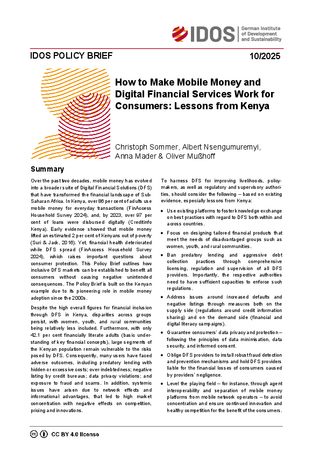How to make mobile money and digital financial services work for consumers: lessons from Kenya
Sommer, Christoph / Albert Nsengumuremyi / Anna Mader / Oliver MußhoffPolicy Brief (10/2025)
Bonn: German Institute of Development and Sustainability (IDOS)
DOI: https://doi.org/10.23661/ipb10.2025
Over the past two decades, mobile money has evolved into a broader suite of Digital Financial Solutions (DFS) that have transformed the financial landscape of Sub-Saharan Africa. In Kenya, over 86 per cent of adults use mobile money for everyday transactions (FinAccess Household Survey 2024), and, by 2023, over 97 per cent of loans were disbursed digitally (Creditinfo Kenya). Early evidence showed that mobile money lifted an estimated 2 per cent of Kenyans out of poverty (Suri & Jack, 2016). Yet, financial health deteriorated while DFS spread (FinAccess Household Survey 2024), which raises important questions about consumer protection. This Policy Brief outlines how inclusive DFS markets can be established to benefit all consumers without causing negative unintended consequences. The Policy Brief is built on the Kenyan example due to its pioneering role in mobile money adoption since the 2000s.
Despite the high overall figures for financial inclusion through DFS in Kenya, disparities across groups persist, with women, youth, and rural communities being relatively less included. Furthermore, with only 42.1 per cent financially literate adults (basic understanding of key financial concepts), large segments of the Kenyan population remain vulnerable to the risks posed by DFS. Consequently, many users have faced adverse outcomes, including predatory lending with hidden or excessive costs; over-indebtedness; negative listing by credit bureaus; data privacy violations; and exposure to fraud and scams. In addition, systemic issues have arisen due to network effects and informational advantages, that led to high market concentration with negative effects on competition, pricing and innovations. To harness DFS for improving livelihoods, policymakers, as well as regulatory and supervisory authorities, should consider the following – based on existing evidence, especially lessons from Kenya:
• Use existing platforms to foster knowledge exchange on best practices with regard to DFS both within and across countries.
• Focus on designing tailored financial products that meet the needs of disadvantaged groups such as women, youth, and rural communities.
• Ban predatory lending and aggressive debt collection practices through comprehensive licensing, regulation and supervision of all DFS providers. Importantly, the respective authorities need to have sufficient capacities to enforce such regulations.
• Address issues around increased defaults and negative listings through measures both on the supply side (regulations around credit information sharing) and on the demand side (financial and digital literacy campaigns).
• Guarantee consumers’ data privacy and protection – following the principles of data minimisation, data security, and informed consent.
• Oblige DFS providers to install robust fraud detection and prevention mechanisms and hold DFS providers liable for the financial losses of consumers caused by providers’ negligence.
• Level the playing field – for instance, through agent interoperability and separation of mobile money platforms from mobile network operators – to avoid concentration and ensure continued innovation and healthy competition for the benefit of the consumers.


